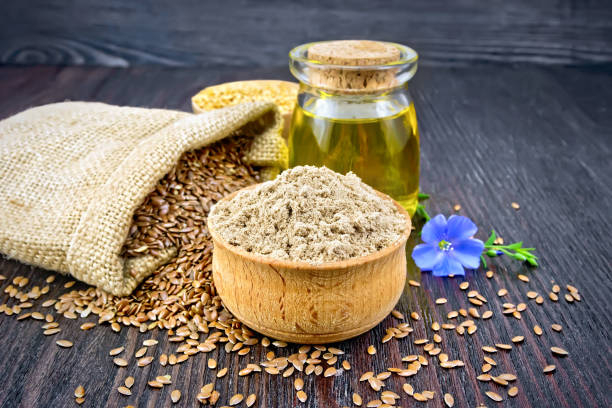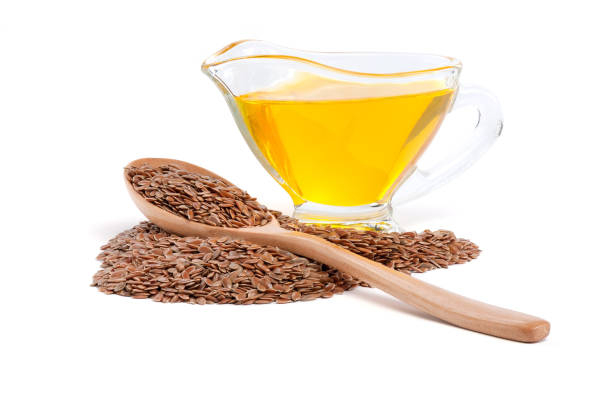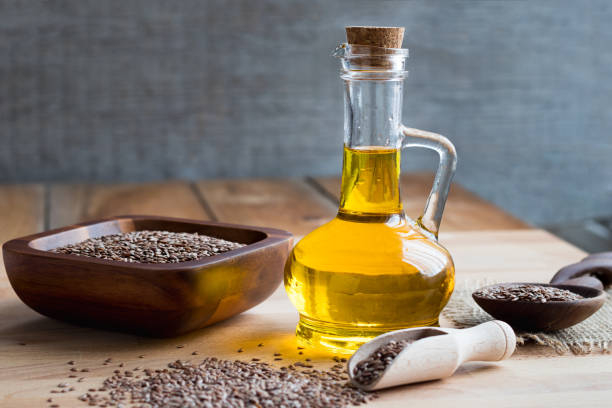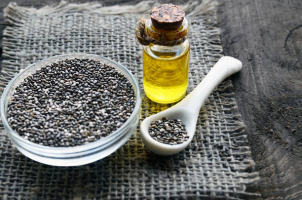Top 7 Health Benefits of Flaxseed Oil
Flax seeds are well-known for their various health advantages, which include giving you a substantial amount of protein and fiber, lowering your hunger, and ... read more...helping you maintain a healthy weight. Given their exceptional nutrient composition, it is not surprising that flaxseed oil is likewise brimming with the same health advantages. Flax seeds are ground and pressed to liberate their natural oil to create flaxseed oil, also known as flax oil or linseed oil. There are numerous applications for this healthy oil, from cooking to skincare. This article will explore some of the top benefits of flaxseed oil.
-
Like flax seeds, flaxseed oil is a rich source of omega-3 fatty acids, which are good for the heart. In fact, an astonishing 7,196 mg of omega-3 fatty acids are included in just one tablespoon (15 ml). Alpha-linolenic acid (ALA), a type of omega-3 fatty acid that is only marginally converted to active forms of omega-3, such as EPA and DHA, is present in flaxseed oil. Most recommendations call for at least 1,600 mg of ALA omega-3 fatty acids daily for males and 1,100 mg for women if you aren't receiving enough DHA and EPA in your diet.
Your daily ALA requirements can be met and even exceeded by just one spoonful of flaxseed oil. Omega-3 fatty acids have been linked to advantages like less inflammation, enhanced heart health, and protection for the brain against aging. They are crucial for good health. Flaxseed oil might be a useful option to help supplement your diet with the essential omega-3 fatty acids if you don't take fish oil or consume one to two servings of fatty fish each week.

High in Omega-3 Fatty Acids 
High in Omega-3 Fatty Acids -
There is some indication that flaxseed oil may help slow the growth of cancer cells, even if the existing body of research is only comprised of test-tube and animal studies. Mice received 0.3 ccs of flaxseed oil daily for 40 days in one investigation on animals. It was discovered to stop the growth of lung tumors and the spread of cancer. The development of colon cancer in rats was demonstrated to be prevented by flaxseed oil in a different small animal investigation.
Additionally, research conducted in test tubes has generated results that are comparable, with multiple studies demonstrating that flaxseed oil inhibits the growth of breast cancer cells. Even while these results are encouraging, additional study is still required to establish how they might apply to people.
May Help Reduce Cancer Cell Growth 
May Help Reduce Cancer Cell Growth -
According to several studies, flaxseed oil may be good for your heart. In one study, 59 participants were used to evaluate the effects of safflower oil, which is high in omega-6 fatty acids, on flaxseed oil. In this study, supplementing for 12 weeks with one tablespoon (15 ml) of flaxseed oil instead of safflower oil resulted in considerably reduced blood pressure levels. Since high blood pressure puts the heart under more strain and makes it work harder, it can be harmful to heart health.
Additionally, flaxseed oil might make the arteries' suppleness better. In general, decreased elasticity is associated with both aging and elevated blood pressure. These advantages are most likely attributable to flaxseed oil's high concentration of omega-3 fatty acids, which has been proven to considerably enhance the level of omega-3s in the blood when taken as a supplement. Furthermore, multiple studies have demonstrated the positive effects of omega-3 fatty acids on heart health, including benefits like lowered blood pressure and reduced inflammation.

Could Benefit Heart Health 
Could Benefit Heart Health -
Both diarrhea and constipation may be effectively treated with flaxseed oil. Flaxseed oil acts as an antidiarrheal agent while also serving as a laxative to promote regularity, according to a new animal study. In a different trial, 50 hemodialysis patients who were constipated received either flaxseed oil, olive oil, or mineral oil.
After four weeks, flaxseed oil improved the consistency of the stool and increased bowel motions. It was also discovered to be just as efficient as mineral oil and olive oil. However, studies on humans with specific illnesses and studies on animals are presently the only ways to learn about the effects of flaxseed oil on diarrhea and constipation. To assess its effectiveness in the general population, more research is required.

May Help Treat Constipation and Diarrhea 
May Help Treat Constipation and Diarrhea -
Additionally, flaxseed oil might improve skin health. 13 women were given flaxseed oil supplements for 12 weeks in one short research. At the conclusion of the trial, their skin's hydration and smoothness had improved, and its susceptibility to irritation and roughness had diminished. Recent research on animals revealed flaxseed oil had comparable beneficial effects.
Flaxseed oil was administered to dermatitis-infected mice for three weeks. It has been demonstrated that the oil lessens atopic dermatitis symptoms like redness, swelling, and itching. However, no research has examined the advantages of using flaxseed oil on people's skin. However, there are several anecdotal claims of smoothness improvements and decreased irritation following the application of flaxseed oil.

May Improve Skin Health 
May Improve Skin Health -
Some research suggests that flaxseed oil may assist some populations to reduce inflammation because of its omega-3 fatty acid concentration. The general public's inflammatory response to flaxseed oil, however, was not affected, according to one review of 20 research. In spite of this, it markedly decreased the levels of C-reactive protein, a marker used to assess inflammation, in obese individuals. The powerful anti-inflammatory benefits of flaxseed oil were also discovered in an animal investigation. According to research, the anti-inflammatory properties of flaxseed oil are comparable to those of olive oil.
For instance, a 37-person trial found that, in contrast to olive oil, flaxseed oil supplementation had no effect on any inflammatory indicators in healthy, normal-weight adults. More research is required to assess the effects of flaxseed oil on inflammation in the general population, despite the fact that it appears that individuals may respond differently to it.

May Reduce Inflammation 
May Reduce Inflammation -
One of the best plant sources of lignans is flaxseed oil. These are anti-inflammatory and antioxidant substances. According to Peart, chronic inflammation is connected to a wide range of health problems, such as obesity, metabolic syndrome, Type 2 diabetes, and heart disease. An encouraging correlation between flaxseed oil's capacity to lessen the kind of stress that promotes inflammation was discovered by a meta-analysis of studies published in 2018.
Peart also points out that the first study to link flaxseed eating with a lower risk of breast cancer was a 2013 Canadian study, which is older but still significant. This was brought on by the lignans in flaxseed oil. Although additional research is required, researchers are also investigating if lignans may help lower the risk of osteoporosis and heart disease.

Contain Lignans 
Contain Lignans




























